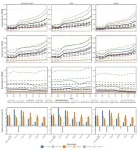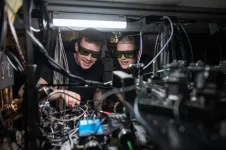(Press-News.org) UNIVERSITY PARK, Pa. — Fool me once, shame on you. Fool myself, and I may end up feeling smarter, according to a new study led by Sara Dommer, assistant professor of marketing at Penn State.
Dommer wondered why people cheat on tasks like completing crossword puzzles or Wordle and counting calories when the rewards are purely intrinsic, like feeling smarter or healthier. She found that when cheating offers the opportunity to improve self-perception, individuals engage in diagnostic self-deception — that is, they cheat yet deceive themselves by attributing their heightened performance to their innate ability instead of the cheating. She published her findings in the Journal of the Association for Consumer Research.
“I found that people do cheat when there are no extrinsic incentives like money or prizes but intrinsic rewards, like feeling better about yourself,” Dommer said. “For this to work, it has to happen via diagnostic self-deception, meaning that I have to convince myself that I am actually not cheating. Doing so allows me to feel smarter, more accomplished or healthier.”
Dommer conducted four studies to determine if people will cheat when rewards are solely intrinsic and what drives the feeling of accomplishment despite the cheating. In the first study, 288 undergraduate students received menu information about three days’ worth of meals — like three pancakes with butter — and were tasked with entering calorie information into a food-tracking app. The students were divided into two groups, with one group receiving additional calorie counts accompanying the meal descriptions.
The app listed five potential calorie options for each food entered. For example, the calorie counts for three pancakes with butter ranged from 300 to 560 calories. The group without specific calorie information could have averaged the five options to compensate for the missing information and get a better idea of the true caloric value of each meal, according to Dommer. Instead, participants in this group tended to enter fewer calories than the group that received specific calorie information, suggesting that people will cheat for intrinsic benefits, in this case feeling healthier.
The second study included 195 participants recruited on Amazon Mechanical Turk. These participants were divided into two groups — a control group and a cheat group — and asked to complete a 10-question, multiple choice IQ test. Those assigned to the cheat group were told that correct answers would be highlighted so they could keep track of their progress. After the exam, participants in the cheat group were asked to enter the number of questions they got correct, while the control group had to estimate their scores. Then the program graded both groups’ tests, and participants were asked to predict their score on an additional 10-question IQ test, this time one that did not allow for the possibility to cheat.
Dommer found that participants in the cheat group reported higher scores than those in the control group and, based on their self-reporting, overestimated their performance on the second IQ test. The results, she said, suggested that participants in the cheat group engaged in diagnostic self-deception, believing that their performance was due to their intelligence and not cheating, though their scores on the second test suggest otherwise.
The third study mirrored the second study, except this time 195 participants had to unscramble letters to find a word, like deciphering “utmost” from “motuts.” Individuals assigned to the control group had to enter their answers in an answer box, while those in the cheat group were shown the correct answer after 3 minutes and asked to self-report their scores. Then participants rated on a scale from one to seven, with one being “not at all” and seven being “very much so,” how much their intelligence and the task’s difficulty contributed to their performance. They used a similar scale to answer the question, “To what extent do you agree that unscrambling words is an accurate test of intelligence?”
Again, Dommer found that those in the cheat group reported successfully unscrambling more words than those in the control group. Compared to the control group, this group was more likely to attribute their performance to their intelligence and more likely to consider the task a legitimate test of intelligence.
“Participants in the cheat group engaged in diagnostic self-deception and attributed their performance to themselves,” Dommer said. “The thinking goes, ‘I’m performing well because I’m smart, not because the task allowed me to cheat.’”
The final study asked 231 participants to take a financial literacy test. Participants were divided into control and cheat groups, except this time the researcher had about half of each group read a statement about how most American adults cannot pass a basic financial literacy test. Dommer thought that introducing uncertainty about their own financial literacy may make individuals value accuracy over performance and reduce cheating. After taking the test, participants used a scale from one to seven to rate themselves on 15 traits related to financial literacy.
Dommer found that introducing the uncertainty statement decreased cheating as individuals sought more accurate measures of their financial literacy.
“How do we stop people from engaging in diagnostic self-deception and get a more accurate representation of who they are? One way is to draw their attention to uncertainty around the trait itself. This seems to mitigate the effect,” Dommer said.
Our society tends to think of “cheating” as a strategic, intentional act, Dommer said. This work, she explained, suggests that at times cheating happens beyond conscious awareness.
“I don’t think there’s a good cheating or a bad cheating,” she said. “I just think it’s interesting that not all cheating has to be conscious, explicit and intentional. That said, these illusory self-beliefs can still be harmful, especially when assessing your financial or physical health. When a person engages in diagnostic self-deception, they may underuse products and services designed to help them. This is why it’s important to be aware of illusory beliefs and strive to seek accurate self-assessments.”
END
Fool yourself: People unknowingly cheat on tasks to feel smarter, healthier
2025-02-05
ELSE PRESS RELEASES FROM THIS DATE:
Rapid increase in early-onset type 2 diabetes in China highlights urgent public health challenges
2025-02-05
A new study led by researchers from Peking University, published in Health Data Science, reveals a sharp rise in the burden of early-onset type 2 diabetes (T2D) among adolescents and young adults in China from 1990 to 2021. Despite improvements in mortality rates, the incidence and disability-adjusted life years (DALYs) associated with the disease have grown alarmingly.
Using data from the Global Burden of Disease (GBD) Study 2021, the study shows that the age-standardized incidence rate nearly doubled, increasing from 140.20 per 100,000 in 1990 to 315.97 per 100,000 in 2021, with an average annual percentage change ...
Researchers discover the brain cells that tell you to stop eating
2025-02-05
NEW YORK, NY (Feb. 5, 2025)--Columbia scientists have found specialized neurons in the brains of mice that order the animals to stop eating.
Though many feeding circuits in the brain are known to play a role in monitoring food intake, the neurons in those circuits do not make the final decision to cease eating a meal.
The neurons identified by the Columbia scientists, a new element of these circuits, are located in the brainstem, the oldest part of the vertebrate brain. Their discovery could lead ...
Salt substitution and recurrent stroke and death
2025-02-05
About The Study: The results of this cluster trial demonstrate that salt substitution was safe, along with reduced risks of stroke recurrence and death, which underscores large health gains from scaling up this low-cost intervention among patients with stroke.
Corresponding Authors: To contact the corresponding authors, email Lijing L. Yan, MPH, PhD, (lijing.yan@duke.edu) and Maoyi Tian, PhD, (maoyi.tian@hrbmu.edu.cn)
To access the embargoed study: Visit our For The Media website at this link https://media.jamanetwork.com/
(doi:10.1001/jamacardio.2024.5417)
Editor’s Note: Please see the article for additional information, ...
Firearm type and number of people killed in publicly targeted fatal mass shooting events
2025-02-05
About The Study: This study found that most publicly targeted fatal mass shootings involved multiple types of firearms and handguns were the most common type of firearm present. Assault weapons being present during a publicly targeted mass shooting was associated with a slight increase in the number of injuries and deaths occurring during that incident.
Corresponding Author: To contact the corresponding author, Leslie M. Barnard, MPH, DrPH, email leslie.barnard@ucdenver.edu.
To access the embargoed study: Visit our For The Media website at this link https://media.jamanetwork.com/
(doi:10.1001/jamanetworkopen.2024.58085)
Editor’s ...
Recent drug overdose mortality decline compared with pre–COVID-19 trend
2025-02-05
About The Study: Drug overdose deaths have increased exponentially since 1979. This rate of increase accelerated during the COVID-19 pandemic but has since waned. When comparing recent drug-related mortality rates with their pre-2020 trajectory, the vast majority of states remained higher than expected. In the 4 years between 2020 and 2023, nearly all states had higher drug-related mortality rates than their 2019 rates.
Corresponding Author: To contact the corresponding author, Keith Humphreys, ...
University of Cincinnati experts present research at International Stroke Conference 2025
2025-02-05
University of Cincinnati experts will present research at the International Stroke Conference 2025 in Los Angeles.
Study finds small number of patients eligible for new ICH treatment
Intracerebral hemorrhage (ICH), when there is bleeding into brain tissue from the rupture of a damaged blood vessel, is one of the most devastating types of stroke. Patients often suffer from severe neurologic disability or even death. There were no proven treatments for patients with ICH until recently.
“We now have one ...
Physicists measure a key aspect of superconductivity in “magic-angle” graphene
2025-02-05
Superconducting materials are similar to the carpool lane in a congested interstate. Like commuters who ride together, electrons that pair up can bypass the regular traffic, moving through the material with zero friction.
But just as with carpools, how easily electron pairs can flow depends on a number of conditions, including the density of pairs that are moving through the material. This “superfluid stiffness,” or the ease with which a current of electron pairs can flow, is a key measure of a material’s superconductivity.
Physicists at MIT and Harvard University have now directly measured superfluid stiffness for the first time ...
Study in India shows kids use different math skills at work vs. school
2025-02-05
In India, many kids who work in retail markets have good math skills: They can quickly perform a range of calculations to complete transactions. But as a new study shows, these kids often perform much worse on the same kinds of problems as they are taught in the classroom. This happens even though many of these students still attend school or attended school through 7th or 8th grades.
Conversely, the study also finds, Indian students who are still enrolled in school and don’t have jobs do better on school-type math problems, but they often fare poorly at the kinds of problems that occur in marketplaces.
Overall, both the “market kids” and the “school kids” ...
Quantum algorithm distributed across multiple processors for the first time – paving the way to quantum supercomputers
2025-02-05
UNDER EMBARGO UNTIL 16:00 GMT / 11:00 ET WEDNESDAY 5 FEBRUARY 2025
Quantum algorithm distributed across multiple processors for the first time – paving the way to quantum supercomputers
In a milestone that brings quantum computing tangibly closer to large-scale practical use, scientists at Oxford University Physics have demonstrated the first instance of distributed quantum computing. Using a photonic network interface, they successfully linked two separate quantum processors to form a single, fully connected ...
Why antibiotics can fail even against non-resistant bacteria
2025-02-05
Antibiotics are indispensable for treating bacterial infections. But why are they sometimes ineffective, even when the bacteria are not resistant? In their latest study published in the journal Nature, researchers from the University of Basel challenge the conventional view that a small subset of particularly resilient bacteria are responsible for the failure of antibiotic therapies.
In certain infectious diseases caused by bacteria, antibiotics are less effective than expected. One example is infections caused by Salmonella bacteria, which can lead to illnesses such ...


